You are using an out of date browser. It may not display this or other websites correctly.
You should upgrade or use an alternative browser.
You should upgrade or use an alternative browser.
My Huge Sid Milk Run
- Thread starter Chamnix
- Start date
Spoonwood: I doubt Chamnix is against some random observations; when I used to have threads, I enjoyed reading what people thought because it would help my own attempts become more efficient.
Of course, any of us could recommend such strategies as the ones you've named, but I've only spoken of the ones directly pertinent to what Chamnix has encountered in this particular game.
When these sort of games take countless hours to generate and choose an excellent map and countless more to play each map out, I doubt anyone is really against the "peanut gallery".

-Elear
Of course, any of us could recommend such strategies as the ones you've named, but I've only spoken of the ones directly pertinent to what Chamnix has encountered in this particular game.
When these sort of games take countless hours to generate and choose an excellent map and countless more to play each map out, I doubt anyone is really against the "peanut gallery".

-Elear
AutomatedTeller
Frequent poster
well, once he gets through ottoman's he'll have a ton of science farms, so he can catch up in tech. I would think this is the hardest time of the game. I certainly wouldn't abandon it (not that I've even tried this 

I appreciate any and all comments. If anyone has suggestions for what I could be doing better, I definitely want to hear them  .
.
There are no thoughts of abandoning this map at this point. Quite simply, I dont think I could do better on a different map. If I were going to abandon this map, then I would just go back to deity, but Im a long way from even considering that.
I understand Republic is better if you can manage it properly, but I really dont know how people manage Republic at this type of game. Just from the shear quantity of units you have to fight, you will suffer from significant war weariness regardless of how carefully you fight. Since I am a big believer in bombardment for these games, my units costs would be astronomical in Republic. And the goal is not just to reach domination, but to reach it fast and with somewhat happy people. I think in this type of game, Republic may be a better government, but Monarchy is a better government for me.
I think Ill be fine once the Russians break our deals. Right now at 100% research I could do 630 bpt plus scientists. The Russians are just taking longer than I hoped to betray me.
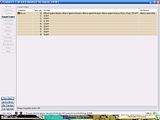
The Ottomans have been a monster in this game although the Russians have been very good also:

But the Ottomans have had a huge tech lead they are the only tribe with Chemistry still, and apparently they have Metallurgy also since I dont see walls around New Edrine, and they have the Great Wall. They were also the first to start (and they already finished) both JS Bachs and Copernicus. Of the 16 wonders built so far, 8 belong to the Ottomans. I think Im very fortunate that the Ottomans dont seem to have saltpeter. If I started facing Sipahi, then I might have to reconsider this map, but since I havent seen any muskets at all, I should be OK.
Ill have to keep an eye on the Russians, but the Ottomans are certainly not one of the weaker tribes.
I just wish my name were Moonsinger .
.
How is your attempt going, ignas?
 .
.There are no thoughts of abandoning this map at this point. Quite simply, I dont think I could do better on a different map. If I were going to abandon this map, then I would just go back to deity, but Im a long way from even considering that.
I understand Republic is better if you can manage it properly, but I really dont know how people manage Republic at this type of game. Just from the shear quantity of units you have to fight, you will suffer from significant war weariness regardless of how carefully you fight. Since I am a big believer in bombardment for these games, my units costs would be astronomical in Republic. And the goal is not just to reach domination, but to reach it fast and with somewhat happy people. I think in this type of game, Republic may be a better government, but Monarchy is a better government for me.
How are planning to research in future? How many beakers @ 100% science? Monarchy is not the best for this. Consider Republic in next game although I wish you luck in this one.
I think Ill be fine once the Russians break our deals. Right now at 100% research I could do 630 bpt plus scientists. The Russians are just taking longer than I hoped to betray me.

The primary fear with going too slow is that your enemies will develop Infantry as you get Cavalry. Are the Ottomans at least decently powerful in your game? If not, you may be fooling around with a weaker civ while a superpower develops, not that you have any choice.
The Ottomans have been a monster in this game although the Russians have been very good also:

But the Ottomans have had a huge tech lead they are the only tribe with Chemistry still, and apparently they have Metallurgy also since I dont see walls around New Edrine, and they have the Great Wall. They were also the first to start (and they already finished) both JS Bachs and Copernicus. Of the 16 wonders built so far, 8 belong to the Ottomans. I think Im very fortunate that the Ottomans dont seem to have saltpeter. If I started facing Sipahi, then I might have to reconsider this map, but since I havent seen any muskets at all, I should be OK.
Ill have to keep an eye on the Russians, but the Ottomans are certainly not one of the weaker tribes.
Oh... his name is Chamnix, not Ignas, nor Elear, nor Spoonwood, nor Moonsinger. You never know... he might have better ideas than the peanut gallery.
His name is Chamnix
I just wish my name were Moonsinger
 .
.How is your attempt going, ignas?
Since the Ottomans are powerful, by no means should you abandon the game.  I wasn't aware they didn't have saltpeter, that changes everything. As long as the war progresses, hopefully you can blitz; perhaps we just have to be a little more patient while you clear their stacks and work the killing zone.
I wasn't aware they didn't have saltpeter, that changes everything. As long as the war progresses, hopefully you can blitz; perhaps we just have to be a little more patient while you clear their stacks and work the killing zone.
 I wasn't aware they didn't have saltpeter, that changes everything. As long as the war progresses, hopefully you can blitz; perhaps we just have to be a little more patient while you clear their stacks and work the killing zone.
I wasn't aware they didn't have saltpeter, that changes everything. As long as the war progresses, hopefully you can blitz; perhaps we just have to be a little more patient while you clear their stacks and work the killing zone.Chamnix said:I think I’ll be fine once the Russians break our deals. Right now at 100% research I could do 630 bpt plus scientists. The Russians are just taking longer than I hoped to betray me.
I kind of wonder about this. Moonsinger's notes seem to indicate that loans like the ones you have going on decrease the AI of betraying you.
If you don't play another map, forget the following. If you play another map, I'd pretty much say what I already said (which you probably have consider already... you've checked Moonsinger's notes and save, right?).
1. Play against all scientific opponents. This way you get as many techs you can for the cheapest cost, via free techs. The AIs research faster this way also, so you'll get to military tradition and replacable parts faster this way... in other words faster towards the domination limit.
2. It's a huge map, so having faster workers comes out huge. Having to clear 15 jungle tiles on a large or huge map vs. 5 tiles on a smaller map size definitely implies that you get more of a benefit from faster workers. Beyond this, faster roads for earlier commerce and water for growth earlier, as well as really all worker jobs getting done faster, definitely implies faster workers as much more powerful overall on a huge map than elsewhere. So, the Maya.
3. Do min runs in the beginning and then lone scientist research shortly there afterwards. This way you can keep your citizens happy and have an economy this way. 3 beakers for 50 turn research comes out a lot more efficient use of commerce than 600 beakers for 8 turn research.
4. Along with 3. and 1. goes that you won't need libraries in any city except in maybe some border towns to avoid flips. Markets also have a lot more impact this way.. and you'll have them for happiness anyways. You can get them up earlier this way. You can also get more of an army, since you won't need 80 shields for a library, you can train a unit or two instead.
5. Become the AIs banker from the early game on. That money will help you to buy tech as desired, maybe help with unit upgrades, and probably keep some AIs at bay. It'll also help to fuel the tech pace.
6. Use gifting to cheapen techs at age changes.
7. You'll obviously create some mines while in despotism. But after this, irrigate non-mined sqaures to speed growth. You have better techs for units faster, and you don't need libraries, so don't worry all too much about low production.
8. Train workers from size 12 (or about to become) cities, so your empire keeps on growing... especially ones with granaries. At least before you go to war.
9. Republic produces more commerce, so it's the way to go both for money and happiness. If you have more irrigation and less mines, then you can put more citizens on tax collector/entertainer duty and cope with war weariness well (or so I think... this makes sense to me... I don't have experience with much of this), or better at least. Unit costs don't come as so much of a problem if you don't have to do research, right?
10. Artillery and armies rock!
11. If you're worried about production due to lack of mines, plant forests and chop them. You have industrious workers, right?
12. Along with the above let-the-AI-research-for-you strategy... do banks make sense? I'd guess not, since that's too many shields, but I don't know.
Only 12. comes as a somewhat original thought. 1 through 9 already have gotten implemented in one place. Maybe I don't understand the reasoning for them quite right or something, but it's better than nothing, right?
Donny Brook
Warlord
- Joined
- Sep 9, 2004
- Messages
- 120
I understand Republic is better if you can manage it properly, but I really dont know how people manage Republic at this type of game. Just from the shear quantity of units you have to fight, you will suffer from significant war weariness regardless of how carefully you fight. Since I am a big believer in bombardment for these games, my units costs would be astronomical in Republic. And the goal is not just to reach domination, but to reach it fast and with somewhat happy people. I think in this type of game, Republic may be a better government, but Monarchy is a better government for me.
IIRC, SirPleb felt the same way about his SID HOF game. I'm not convinced that Republic is significantly better than Monarchy for a HOF histo game at higher levels.
It seems to me that you want an early conquest/domination date to maximize your score. That means early war...always war...drawn-out wars...DOW when it suits YOU...etc. I get the whole oscillating war strategy, but doesn't that slow your progress (at least before rails arrive)?
I'm not an elite player but IMHO, Monarchy seems to offer more happy faces and an earlier conq/dom date. These are two very important conditions for a high score. Of course, it's easy to point to Moonsinger's games as evidence to the contrary, but I wonder if she could do even better with a Monarchy approach? She's pretty bright and it wouldn't surprise me if she could come up with something to take advantage of everything that Monarchy has to offer.
Anyway, let's not hijack the thread by turning it into a government debate...
How is your attempt going, ignas?
Abandoned, lost reputation too early for my liking and found out that the map wasn't very favourable.
Sorry to hear that ignas  .
.
Moonsinger is a much better player than I am, so I can’t really argue with any of what she said, but I will offer a different perspective on at least some of her points:
She might be right, but let’s just say I’m skeptical. I have seen dozens of reasons presented by people of what they “noticed” makes the AI declare war from having current deals to not being able to afford gpt payments to having an empty city near their units. I have also seen dozens of claims that people have “noticed” that the RNG is biased.
As far as I know, nobody knows exactly what makes the AI more or less likely to declare war. I was going to do a study at one point, but I got sidetracked. My personal theory is that there are very few variables that go into the probability – attitude, maybe military strength and nothing else. Until somebody does a study, I’m not going to base strategy on what I think will make the AI more or less likely to declare.
Mayans vs. Iroquois is kind of like Monarchy vs. Republic in my opinion. I don’t doubt that in the right hands, the Mayans are the best for this type of game. However, I think I will score better with the Iroquois. Industrious is a great trait, and I would love to have it, but everything else to me points toward the Iroquois.
I don’t like the javelin thrower at all. I generally don’t like unique units that are more expensive than the unit they replace, I don’t like unique units given extra defense, and I especially don’t like offensive unique units given extra defense. Enslave is a nice ability, but I don’t know how I would use it. I think Moonsinger had barbarians in her game, but I don’t want them for a variety of reasons. You can’t win many battles against Sid AI with a unit that weak. By the time my first war started, I think I was already going against pikes – you can redline them, but paying 30 shields for a unit that will lose that often isn’t worth it for me.
I also really want to start with Alphabet. Starting with Alphabet as a monopoly, I’m confident I can get to Philosophy first, trade to Monarchy, and get Literature first. Essentially, I can easily keep tech parity through the Ancient Age with this method. Moonsinger may not need any of that, but I think I would struggle an awful lot without those crutches.
On Sid level, I don’t want to speed research; I want to slow it down. I don’t have the confidence that I could stay in control of a fast tech pace. Again, a fast tech pace is better in the hands of the right player, but I think it is far too likely I would get myself in deep trouble this way.
I’ll have to respectfully disagree with this. I don’t think it is good to take your large cities out of production for even the 1 turn periodically to build a worker. I will build cities at size 6 if they can’t go to 7, and I believe in having an endless supply of workers from corrupt towns, but I won’t build workers in size 12 cities.
Indeed, and I do think the fact that it took me until elite victories #25 and #55 to get my first 2 armies set me back quite a bit. I can’t complain about my luck overall because I know I’ve gotten lucky in lots of other ways, but I can’t help feeling I would have made a lot more progress at this point if I had gotten luckier with leaders.
 .
.Moonsinger is a much better player than I am, so I can’t really argue with any of what she said, but I will offer a different perspective on at least some of her points:
I kind of wonder about this. Moonsinger's notes seem to indicate that loans like the ones you have going on decrease the AI of betraying you.
She might be right, but let’s just say I’m skeptical. I have seen dozens of reasons presented by people of what they “noticed” makes the AI declare war from having current deals to not being able to afford gpt payments to having an empty city near their units. I have also seen dozens of claims that people have “noticed” that the RNG is biased.
As far as I know, nobody knows exactly what makes the AI more or less likely to declare war. I was going to do a study at one point, but I got sidetracked. My personal theory is that there are very few variables that go into the probability – attitude, maybe military strength and nothing else. Until somebody does a study, I’m not going to base strategy on what I think will make the AI more or less likely to declare.
2. It's a huge map, so having faster workers comes out huge. Having to clear 15 jungle tiles on a large or huge map vs. 5 tiles on a smaller map size definitely implies that you get more of a benefit from faster workers. Beyond this, faster roads for earlier commerce and water for growth earlier, as well as really all worker jobs getting done faster, definitely implies faster workers as much more powerful overall on a huge map than elsewhere. So, the Maya.
Mayans vs. Iroquois is kind of like Monarchy vs. Republic in my opinion. I don’t doubt that in the right hands, the Mayans are the best for this type of game. However, I think I will score better with the Iroquois. Industrious is a great trait, and I would love to have it, but everything else to me points toward the Iroquois.
I don’t like the javelin thrower at all. I generally don’t like unique units that are more expensive than the unit they replace, I don’t like unique units given extra defense, and I especially don’t like offensive unique units given extra defense. Enslave is a nice ability, but I don’t know how I would use it. I think Moonsinger had barbarians in her game, but I don’t want them for a variety of reasons. You can’t win many battles against Sid AI with a unit that weak. By the time my first war started, I think I was already going against pikes – you can redline them, but paying 30 shields for a unit that will lose that often isn’t worth it for me.
I also really want to start with Alphabet. Starting with Alphabet as a monopoly, I’m confident I can get to Philosophy first, trade to Monarchy, and get Literature first. Essentially, I can easily keep tech parity through the Ancient Age with this method. Moonsinger may not need any of that, but I think I would struggle an awful lot without those crutches.
1. Play against all scientific opponents. This way you get as many techs you can for the cheapest cost, via free techs. The AIs research faster this way also, so you'll get to military tradition and replacable parts faster this way... in other words faster towards the domination limit.
5. Become the AIs banker from the early game on. That money will help you to buy tech as desired, maybe help with unit upgrades, and probably keep some AIs at bay. It'll also help to fuel the tech pace.
6. Use gifting to cheapen techs at age changes.
On Sid level, I don’t want to speed research; I want to slow it down. I don’t have the confidence that I could stay in control of a fast tech pace. Again, a fast tech pace is better in the hands of the right player, but I think it is far too likely I would get myself in deep trouble this way.
8. Train workers from size 12 (or about to become) cities, so your empire keeps on growing... especially ones with granaries. At least before you go to war.
I’ll have to respectfully disagree with this. I don’t think it is good to take your large cities out of production for even the 1 turn periodically to build a worker. I will build cities at size 6 if they can’t go to 7, and I believe in having an endless supply of workers from corrupt towns, but I won’t build workers in size 12 cities.
10. Artillery and armies rock!
Indeed, and I do think the fact that it took me until elite victories #25 and #55 to get my first 2 armies set me back quite a bit. I can’t complain about my luck overall because I know I’ve gotten lucky in lots of other ways, but I can’t help feeling I would have made a lot more progress at this point if I had gotten luckier with leaders.
Chamnix said:I have seen dozens of reasons presented by people of what they “noticed” makes the AI declare war from having current deals to not being able to afford gpt payments to having an empty city near their units.
The first two get prevented by the banker strategy. You currently have gpt funneling to the AI, so they won't declare (given the guess as correct). If they have gpt going to them, they can afford gpt payments to other AIs. The banker strategy I would expect improves attitude. As long as attitude decreases the probability of an AI DOW, then I think it works to prevent unwanted declarations. I don't know, but a guess comes as better than nothing.
Chamnix said:I think Moonsinger had barbarians in her game, but I don’t want them for a variety of reasons.
I don't think she did in her (88k) top game. She says she had sedentary ones in 80k game, but she said she didn't understand why she did so, and consequently I think she played her 88k game later. I don't think she used Javelin Throwers all too much. Maybe to trigger her GA, after some bombardment or something. What makes you think she had barbarians in 88k game?
Chamnix said:By the time my first war started, I think I was already going against pikes – you can redline them, but paying 30 shields for a unit that will lose that often isn’t worth it for me.
Hmmm... a 30 shield mounted warrior with an attack of 3 vs. a fortified pike probably in 7 or above size city, or a size 6- city with walls. Now I *really* feel baffled.
Chamnix said:I also really want to start with Alphabet. Starting with Alphabet as a monopoly, I’m confident I can get to Philosophy first, trade to Monarchy, and get Literature first. Essentially, I can easily keep tech parity through the Ancient Age with this method. Moonsinger may not need any of that, but I think I would struggle an awful lot without those crutches.
This comes purely as a hunch on my part, but it almost seems like you suffer from the impression that this will play out like a game with the maximum number of tribes. In other words, I don't think you'd struggle with this. I mean, what year did you or the first AI enter the middle ages? Also, don't the AIs slow down later so that even if you trail early on, you can catch up later by buying and trading tech? Do you really even need somewhat parity if you get the right military technologies and can bash the AIs, extort tech, and then cripple them (you'll do it anyways eventually)? In Moonsinger's 88k game, she just started her 50 turner on Chemistry in 10 AD. I've had plenty of stanard 7-opponent pangea Deity games that move faster than that, where I had libraries and universities up by then... shields I could have put to barracks and military if I had played for other victory conditions. I seriously think you've underrated yourself here.
I feel further lost by your comment about staying "in control" of the tech pace. What do you need "control" for exactly? As I see it, you need Replacable Parts and Military Tradition. Granted, AIs with bombers might not play out as too fun, but you don't necessarily have to catch the best AI or two. You just have to bash them before they launch the spaceship or somehow manage a diplomatic victory (will they even hold elections? If they play like they do on lower levels, they might not even do so). Tech cost comes out enormous, so I can't see the best AI or 2 getting 4 turn research throughout the entire modern age, although that's just a guess. I think you underrate your military skills here. Mine on the other hand... well I just finished my first conquest and domination victories last week.
One final thought on the tech pace... after Vanilla, the programmers decided to put SGLs in as an incentive to actually do fast research. That sort of hints the entire game code as programmed in such a way that doing fast research doesn't make sense for a military game.
Chamnix said:I’ll have to respectfully disagree with this. I don’t think it is good to take your large cities out of production for even the 1 turn periodically to build a worker.
Maybe not. I just gleaned it from Moonsinger's 88k 10 AD save (as I did all the other points really). That perhaps might come as the weakest part of her game. But, it does work for overall growth, so maybe not.
The first two get prevented by the banker strategy. You currently have gpt funneling to the AI, so they won't declare (given the guess as correct). If they have gpt going to them, they can afford gpt payments to other AIs. The banker strategy I would expect improves attitude. As long as attitude decreases the probability of an AI DOW, then I think it works to prevent unwanted declarations. I don't know, but a guess comes as better than nothing.
I disagree. An incorrect guess is worse than nothing. What if gpt payments do not change the probability of an AI declaring at all? Then I would be playing suboptimally if I did not borrow their gold. I agree banking changes their attitude, but that is not enough by itself to make me think it is not worth it.
I don't think she did in her (88k) top game. She says she had sedentary ones in 80k game, but she said she didn't understand why she did so, and consequently I think she played her 88k game later. I don't think she used Javelin Throwers all too much. Maybe to trigger her GA, after some bombardment or something. What makes you think she had barbarians in 88k game?
I’m sure you are right – I downloaded one of her starts and saw goody huts, but it could definitely have been the 80k game.
By the time my first war started, I think I was already going against pikes – you can redline them, but paying 30 shields for a unit that will lose that often isn’t worth it for me.
Hmmm... a 30 shield mounted warrior with an attack of 3 vs. a fortified pike probably in 7 or above size city, or a size 6- city with walls. Now I *really* feel baffled.
If you are talking 2 healthy vets in that battle, a mounted warrior will die 40% of the time. A javelin thrower will die 92% of the time. And most of the battles do not happen in cities.
This comes purely as a hunch on my part, but it almost seems like you suffer from the impression that this will play out like a game with the maximum number of tribes.
I think it will play out like a Sid level game.
Also, don't the AIs slow down later so that even if you trail early on, you can catch up later by buying and trading tech?
Not necessarily.
Do you really even need somewhat parity if you get the right military technologies and can bash the AIs, extort tech, and then cripple them (you'll do it anyways eventually)?
I’d be surprised if anyone could extort a Middle Age tech from the AI on a huge Sid map no matter much they bashed them. The techs are just too expensive. You can get discounts, but you can’t count on wholesale tech extortion to catch up.
And it is much easier to bash the AIs and cripple them if they are not way ahead of you technologically.
In Moonsinger's 88k game, she just started her 50 turner on Chemistry in 10 AD.
I didn’t know this, and I find it very surprising and confusing. What is all the talk about speeding the tech pace about if she was still working on Chemistry in 500AD?
I feel further lost by your comment about staying "in control" of the tech pace. What do you need "control" for exactly? As I see it, you need Replacable Parts and Military Tradition.
Sid is outside my comfort zone. On most levels, I start the game already knowing I am going to win, and it is just a matter of how fast. For example, I will build almost no military in a typical ancient age because I know that even if I get attacked, I will be able to recover and catch and pass the AI later so I can afford to take chances. On Sid I don’t know if I’m going to win – my first goal is to make sure I win the game and then I will worry about how fast.
Granted, AIs with bombers might not play out as too fun, but you don't necessarily have to catch the best AI or two. You just have to bash them before they launch the spaceship or somehow manage a diplomatic victory (will they even hold elections?
It’s more than just preventing them from reaching a victory condition. I think you need to bash the AI before you can really milk efficiently. Look at killercane’s deity histo game for example – he reached the domination limit plenty early, but he let one AI stick around, and he got hit by nuclear missiles and war weariness late. The longer you wait to bash them, the harder it is going to be. I’d like to prevent any AI from having infantry in this game. I don’t know how attainable that goal is, but that is my hope.
I'd like to add a comment on the banking issue:
In my one of my Sid attempts some time ago, I documented my use of Moonsinger's banking strategy.
Now this worked generally well at giving me lump sums, gaining better allies and attitudes. HOWEVER, the key to it is that you need to instigate enemy AIs into wars systematically to get your GPT back and this is much more difficult in practice. Too slow, your GPT will flood their science beakers and you will be dead meat (this is why my attempt ultimately got screwed up). Especially when you play with scientific civs as I did, this is liable to create the runaway AI very quickly and unpredictably. Bluntly put, my use of banking with AIs may have ruined my chances of winning because I never could manipulate it to such an extreme extent.
The moral of the story is that the banking strategy is good, but I tend to agree that it's better to go without unless you have a high degree of mastery with using it. What needs to be said is that Moonsinger developed many fine strategies, but unless they are used just as they are supposed to be, it is probably better to forgo them. As Chamnix said, at some ponit, you must just go ahead and win in the way you are comfortable with. It will never produce a record breaking game, but it can allow a win. This ties into the analysis of her 10 AD save in the 88k game...anyone who has played through with that realizes how miraculous a win that was...I've yet to come close to reproducing a win from her save game because there are certain key agonizing decisions that have to play out just right.
This is much the key to Sid level, at least with large and epic games...sometimes no matter what you do, you just cannot win. The completed games we see are only a testament to the dozens of other failed games that turned in the wrong direction.
I hope what I said makes sense to someone.
-Elear
In my one of my Sid attempts some time ago, I documented my use of Moonsinger's banking strategy.
Now this worked generally well at giving me lump sums, gaining better allies and attitudes. HOWEVER, the key to it is that you need to instigate enemy AIs into wars systematically to get your GPT back and this is much more difficult in practice. Too slow, your GPT will flood their science beakers and you will be dead meat (this is why my attempt ultimately got screwed up). Especially when you play with scientific civs as I did, this is liable to create the runaway AI very quickly and unpredictably. Bluntly put, my use of banking with AIs may have ruined my chances of winning because I never could manipulate it to such an extreme extent.
The moral of the story is that the banking strategy is good, but I tend to agree that it's better to go without unless you have a high degree of mastery with using it. What needs to be said is that Moonsinger developed many fine strategies, but unless they are used just as they are supposed to be, it is probably better to forgo them. As Chamnix said, at some ponit, you must just go ahead and win in the way you are comfortable with. It will never produce a record breaking game, but it can allow a win. This ties into the analysis of her 10 AD save in the 88k game...anyone who has played through with that realizes how miraculous a win that was...I've yet to come close to reproducing a win from her save game because there are certain key agonizing decisions that have to play out just right.
This is much the key to Sid level, at least with large and epic games...sometimes no matter what you do, you just cannot win. The completed games we see are only a testament to the dozens of other failed games that turned in the wrong direction.
I hope what I said makes sense to someone.

-Elear
Nicely said.
I would have thought that one reason for some barbs in a game with the Maya would be the goodly chance of enslaving a decent number of barbs. That would allow for less workers popping out of cities and/or quicker land development, leading to explosive growth.
It's clearly worse for warring, though.
I would have thought that one reason for some barbs in a game with the Maya would be the goodly chance of enslaving a decent number of barbs. That would allow for less workers popping out of cities and/or quicker land development, leading to explosive growth.
It's clearly worse for warring, though.
Chamnix said:I disagree. An incorrect guess is worse than nothing. What if gpt payments do not change the probability of an AI declaring at all? Then I would be playing suboptimally if I did not borrow their gold. I agree banking changes their attitude, but that is not enough by itself to make me think it is not worth it.
I certianly don't agree about an incorrect guess working out worse than nothing at all, because you can't test a situation without first having something to test. Not guessing really borders on timidness. GPT payments have other advantages. An attitude change does decrease the probabilty of an AI attacking... I think there exists little question that it does that. There does exist a question as to how much it does so.
Chamnix said:I’m sure you are right – I downloaded one of her starts and saw goody huts, but it could definitely have been the 80k game.
Actually, I'm not. I forgot I could check without too much trouble via the 4000 BC save. She has goody huts in that one, but I hadn't spotted any barbie units or camps by 2750 BC.
Chamnix said:What is all the talk about speeding the tech pace about if she was still working on Chemistry in 500AD?
She probably didn't do so. The AIs probably went to Astronomy and Navigation first, maybe to Banking. She probably bought the last part of Chemistry with some 30-40 turns left on, as a sort of raw guess. Still, she cheapened it through lone scientist research while still having a nice economy, I'd think. I'll guess she then traded it for other techs and gpt, since probably no one, or very few tribes, had gold to buy Chemistry from whoever learned it first (the one she fed the most gpt to, probably).
Chamnix said:I think you need to bash the AI before you can really milk efficiently.
Well maybe *I* would need to do so, since I haven't really engaged in militaristic games. Maybe for you also, I don't know. But, your comment still strikes me as a bit puzzling. Why? Check Moonsinger's 10 AD save for the 88k game and I think you'll get it. Her 80k game notes indicate her using the luxury slider early to keep happiness up. She probably did that in the 88k game also. In the 10 AD save for her 88k game she has less than 20 non-hill/mountain tiles mined. The rest of the tiles that come out worked she has irrigated. She has her other workers irrigating also. She hasn't gone to war yet (I checked the retirement screen), at least not enough that she's had a GA. In other words... she's already milking. So, clearly, at least in principle, one doesn't need to bash the AIs before milking.
On a similar note, and I don't know if she did this, it's possible to have two-turn worker pump starting at one turn on size 11, and one turn on size 12. Of course, you'd pretty much have to do that in a core city. On a huge map, would you lose a lot of military production because of this? Not if you used those workers to plant and then chop forests elsewhere I'd suspect. I'd suspect size 6 towns, post-despotism, work out better for score if you can get the aqueduct in as soon as possible and grow them as much as possible.
Elear said:The moral of the story is that the banking strategy is good, but I tend to agree that it's better to go without unless you have a high degree of mastery with using it.
Huh? On can't get a high degree of mastery of something without practice first. Inevitably that means one will do something poorly (at least comparatively speaking) the first time or first few times or for quite a long time, as one try it out. That doesn't mean it works out as a bad strategy though, it just means one needs practice. One doesn't decide bike-riding all bad, just because one falls off the seat when first learning how to ride. Nor does a football team necessarily give up their offensive scheme just because they lost their first 2 games. Having said that, maybe better strategies exist than Moonsinger's.
Chamnix's comment "I wish my name was Moonsinger" seems to indicate he wants more a record-breaking win... at least eventually... than just a win.
One thing I noticed on a partial re-read
Chamnix said:The longer you wait to bash them, the harder it is going to be.
I wouldn't feel too sure of this. If you have better units, and the AIs haven't upgraded, they might work out easier to kill. If the AIs also get into more wars with each other and kill each other's units, they'll work out easier to kill. If you can buy/build armies when you war instead of having to farm for MGLs as much, they'll work out easier to kill (armies rock!). If you have an extra square for bombardment, the AI comes out easier to kill (artilleries rock!). I'd also rather have cavs. vs. muskets than mounted warriors vs. pike or really even spears I'd think. Granted that in some ways things will work out harder for warring later than sooner, but some things not so much so. How things balance out, comes as tricky to pinpoint exactly.
I certianly don't agree about an incorrect guess working out worse than nothing at all, because you can't test a situation without first having something to test. Not guessing really borders on timidness. GPT payments have other advantages. An attitude change does decrease the probabilty of an AI attacking... I think there exists little question that it does that. There does exist a question as to how much it does so.
OK – we’ll disagree
 .
.She probably didn't do so. The AIs probably went to Astronomy and Navigation first, maybe to Banking. She probably bought the last part of Chemistry with some 30-40 turns left on, as a sort of raw guess. Still, she cheapened it through lone scientist research while still having a nice economy, I'd think. I'll guess she then traded it for other techs and gpt, since probably no one, or very few tribes, had gold to buy Chemistry from whoever learned it first (the one she fed the most gpt to, probably).
I feel like you are switching positions on me here, Spoonwood. I said I wanted to be in control of the tech pace. You replied it wasn’t necessary to stay at tech parity and as an example mentioned that Moonsinger started her 50 turn run on Chemistry in 10 AD. Now you are saying she bought Chemistry 10-20 turns later and still had AI to sell it to
 .
.As an aside, lone scientist research doesn’t really cheapen techs for purchase – you are charged based on how many beakers you are short even if you have done 49 turns of 1 scientist research.
Well maybe *I* would need to do so, since I haven't really engaged in militaristic games. Maybe for you also, I don't know. But, your comment still strikes me as a bit puzzling. Why? Check Moonsinger's 10 AD save for the 88k game and I think you'll get it. Her 80k game notes indicate her using the luxury slider early to keep happiness up. She probably did that in the 88k game also. In the 10 AD save for her 88k game she has less than 20 non-hill/mountain tiles mined. The rest of the tiles that come out worked she has irrigated. She has her other workers irrigating also. She hasn't gone to war yet (I checked the retirement screen), at least not enough that she's had a GA. In other words... she's already milking. So, clearly, at least in principle, one doesn't need to bash the AIs before milking.
You are right that there are things you can (and possibly should) do to increase score throughout the game. I didn’t mean to say that you cannot milk at all until all AI are confined to 1 tundra city each. I was responding to your comment that “you don't necessarily have to catch the best AI or two. You just have to bash them before they launch the spaceship or somehow manage a diplomatic victory”.
I think to maximize points, you need to be able to devote as much as possible to marketplaces, hospitals, etc. and irrigate everywhere hurting your production. There is a limit to how much you can do this while there are still strong AI around. As long as you need resources spent to defend yourself, you are unable to spend the maximum on cheese, butter, etc. If you can bash the AI and run luxuries along the way, that is definitely best, but if it is a choice between getting some extra points now and dealing with a modern age AI later vs. spending the extra money on military now, I think I am better off not trying to milk too early.
On a similar note, and I don't know if she did this, it's possible to have two-turn worker pump starting at one turn on size 11, and one turn on size 12. Of course, you'd pretty much have to do that in a core city. On a huge map, would you lose a lot of military production because of this? Not if you used those workers to plant and then chop forests elsewhere I'd suspect. I'd suspect size 6 towns, post-despotism, work out better for score if you can get the aqueduct in as soon as possible and grow them as much as possible.
I don’t think it is possible to have a 1-turn pump at size 12 without a hospital/Shakespeare’s – your city would drop to size 11.
A non-industrious worker can plant a forest in 9 turns and chop it in 4. If you spend 10 shields on a worker, then you get those shields back in 13 turns. If your city is capable of 20 spt as many size 12 core cities will be, then it takes 26 turns before you make up the shields. There are also a finite number of shields you can get from forests, and a worker from a corrupt town can chop just as well as a worker from a core town.
Huh? On can't get a high degree of mastery of something without practice first. Inevitably that means one will do something poorly (at least comparatively speaking) the first time or first few times or for quite a long time, as one try it out. That doesn't mean it works out as a bad strategy though, it just means one needs practice. One doesn't decide bike-riding all bad, just because one falls off the seat when first learning how to ride. Nor does a football team necessarily give up their offensive scheme just because they lost their first 2 games. Having said that, maybe better strategies exist than Moonsinger's.
I think the point is that this is not a practice run for me. Maybe I would have been better served to learn that strategy first and then use it, but if I want this to be my successful histograph, then now is not the time to learn it. A football team doesn't try out a play for the first time in a regular season game without practicing it first.
Chamnix's comment "I wish my name was Moonsinger" seems to indicate he wants more a record-breaking win... at least eventually... than just a win.
That was intended to mean that I wish I had her ability, but I don’t think I can ever beat her score.
I wouldn't feel too sure of this. If you have better units, and the AIs haven't upgraded, they might work out easier to kill. If the AIs also get into more wars with each other and kill each other's units, they'll work out easier to kill. If you can buy/build armies when you war instead of having to farm for MGLs as much, they'll work out easier to kill (armies rock!). If you have an extra square for bombardment, the AI comes out easier to kill (artilleries rock!). I'd also rather have cavs. vs. muskets than mounted warriors vs. pike or really even spears I'd think. Granted that in some ways things will work out harder for warring later than sooner, but some things not so much so. How things balance out, comes as tricky to pinpoint exactly.
Fair enough, but I find that if you leave the Sid AI alone, they will pull ahead in research. I have a very hard time keeping up in tech at this level whether I war or not. The cavalry vs. muskets window is often pretty small before it becomes cavalry vs. rifles, and dealing with a Sid AI with bombers is an absolute nightmare. It may not be true for everyone or for all games, but I believe that if I don’t make substantial progress while most AI are in the Middle Ages, then it will get much harder later.
Chamnix said:You replied it wasn’t necessary to stay at tech parity and as an example mentioned that Moonsinger started her 50 turn run on Chemistry in 10 AD.
Sorry, I didn't mean that as an example. I don't know what actually happened in her game, I just guessed. Her notes on the banker strategy indicated she wouldn't buy a tech if she couldn't sell it anyone else, so it seems she didn't feel a need to absolutely control the tech pace.
Chamnix said:As an aside, lone scientist research doesn’t really cheapen techs for purchase – you are charged based on how many beakers you are short even if you have done 49 turns of 1 scientist research.
Hmm... I didn't know that. I still think her strategy cheaper though in the long run. If you can't beat the AIs there (and without libraries, you won't, right?) you can do the first part of research at minimum and save up cash. Then once some other AI has the tech, it becomes cheaper and then maybe you do a little research. I'd expect that on average you'll have more cash this way than going full throtle from the get go.
Chamnix said:There is a limit to how much you can do this while there are still strong AI around.
So, where's the limit? Moonsinger's 10 AD save seems to imply no limit whatsoever. Worker production in the cities where she has mines for the most part and irrigation all over the place. Maybe she didn't train workers and she's played a trick on that 10 AD save or something, but I doubt it. Her 80k write-up says she faced TOW infrantry.
Chamnix said:I don’t think it is possible to have a 1-turn pump at size 12 without a hospital/Shakespeare’s – your city would drop to size 11.
I thought I said 2 turn pump. You have 10 extra food in the box. On turn 1 you have the city at size 11 with 30 food in the box. It grows that turn. On turn 2 you have 20 food in the box. It produces a worker and goes back to size 11. Actually, a lot of non-core cities could probably do this, as only 5 shields at size 12 doesn't seem like too big of a deal.
I hit "next turn" on her 10 AD 88k game save and didn't build a worker in her capital. It got an unhappy citizen, even though she had all the luxuries (no luxury slider on though). So, maybe that's another reason for training workers at size 12.
Chamnix said:A non-industrious worker can plant a forest in 9 turns and chop it in 4. If you spend 10 shields on a worker, then you get those shields back in 13 turns. If your city is capable of 20 spt as many size 12 core cities will be, then it takes 26 turns before you make up the shields. There are also a finite number of shields you can get from forests, and a worker from a corrupt town can chop just as well as a worker from a core town.
Yes, but you can get those shields from more corrupt towns. In effect this means you can get those shields into towns closer to the front, so those units don't have as far to travel. And you keep on getting new towns with more forests to chop, since the AI doesn't do this. Ships also won't have as far to travel. Units from core towns on a huge map vs. 8 opponents have quite a distance to travel. Even once you have steam, that seems like a lot of railroads... and you can't speed up units traveling in ships.
Chamnix said:Maybe I would have been better served to learn that strategy first and then use it, but if I want this to be my successful histograph, then now is not the time to learn it.
I totally agree, and hence I thought "peanut gallery" comments didn't make too much sense until it seemed like you welcomed it. Sorry if we've sidetracked too much.
I thought I said 2 turn pump. You have 10 extra food in the box. On turn 1 you have the city at size 11 with 30 food in the box. It grows that turn. On turn 2 you have 20 food in the box. It produces a worker and goes back to size 11. Actually, a lot of non-core cities could probably do this, as only 5 shields at size 12 doesn't seem like too big of a deal.
You did say that - I misread it
 .
.Back to the game with some good news this turnset
IBT The 2 Babylonians split up, and 4 more land. The Ottomans squeeze 34 units between my armies.
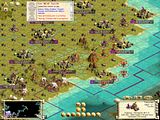
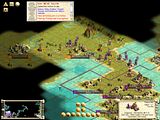
340 AD No kills on the Ottoman front as I cant do much against a 34 unit stack even with my 70 bombardment units. The 3 army wall is put back up as 2 armies continue into Ottoman territory. The Ottoman dyes are pillaged.
In the core, I lose 1 MDI and 1 mounted warrior killing 3 of the 6 Babylonians.

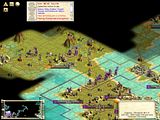
IBT Babylon pillages a mine and unloads 2 more units.
350 AD 4 more elite wins against the Ottomans, and I get leader #6. Kill 2 Babs in the homeland (1 with an elite) without loss.
The gate is open, but an army has moved onto a road where he should significantly reduce the rate of units coming through.
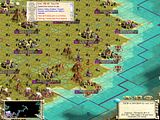
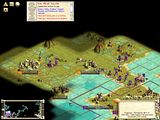
IBT 4 more Babylonians land, but the big news:
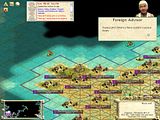
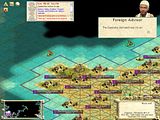
Luxuries now to 0%; Chemistry due in 4. Some peace deals coming soon
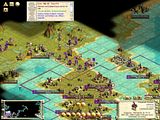
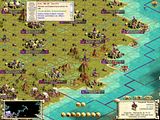
360 AD - First, kill 6 (1 with an elite) of the 7 Babylonians in my territory. The 7th will stick around in case I need to goad them into declaring again. I dont want any alliances with this deal, but the Babylonians will offer me either Ebla or Adab for peace. Adab looks like the slightly less useless, so I take that.

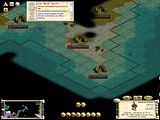
Unfortunately, Babylon has not made it to Astronomy yet, since I still cant trade for their incense. I opt to sign peace with the Mongols also. It costs me 60 gold, but now I can start borrowing Mongolian gold if I want.
The Mongols are still at war with Russia, but that is it. I tell them I will help them against the Russians, it they will help me against the Ottomans. It cost me 16 gpt but seems well worth it to get them fighting the Ottomans again (not least because the Ottomans would probably bribe them into an alliance against me if I didnt hire them first).
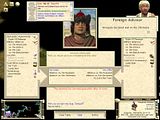
Babylon is at war with the Russians and the Aztecs. I will help them in their wars, if they declare on the Ottomans done for 12 gpt.
Back to my regularly scheduled program of beating up on Ottoman units. Three elite wins, and I get leader #7. I dont have enough bombardment to take out the lead Ottoman stack, but I cut the road behind them. I leave the irrigated tiles alone for now because I want that water for my cities. I extend my frontier just a bit.
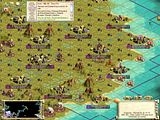
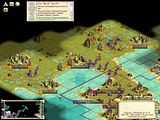
IBT The 2 Babylonians split up, and 4 more land. The Ottomans squeeze 34 units between my armies.


340 AD No kills on the Ottoman front as I cant do much against a 34 unit stack even with my 70 bombardment units. The 3 army wall is put back up as 2 armies continue into Ottoman territory. The Ottoman dyes are pillaged.
In the core, I lose 1 MDI and 1 mounted warrior killing 3 of the 6 Babylonians.


IBT Babylon pillages a mine and unloads 2 more units.
350 AD 4 more elite wins against the Ottomans, and I get leader #6. Kill 2 Babs in the homeland (1 with an elite) without loss.
The gate is open, but an army has moved onto a road where he should significantly reduce the rate of units coming through.


IBT 4 more Babylonians land, but the big news:


Luxuries now to 0%; Chemistry due in 4. Some peace deals coming soon


360 AD - First, kill 6 (1 with an elite) of the 7 Babylonians in my territory. The 7th will stick around in case I need to goad them into declaring again. I dont want any alliances with this deal, but the Babylonians will offer me either Ebla or Adab for peace. Adab looks like the slightly less useless, so I take that.


Unfortunately, Babylon has not made it to Astronomy yet, since I still cant trade for their incense. I opt to sign peace with the Mongols also. It costs me 60 gold, but now I can start borrowing Mongolian gold if I want.
The Mongols are still at war with Russia, but that is it. I tell them I will help them against the Russians, it they will help me against the Ottomans. It cost me 16 gpt but seems well worth it to get them fighting the Ottomans again (not least because the Ottomans would probably bribe them into an alliance against me if I didnt hire them first).

Babylon is at war with the Russians and the Aztecs. I will help them in their wars, if they declare on the Ottomans done for 12 gpt.
Back to my regularly scheduled program of beating up on Ottoman units. Three elite wins, and I get leader #7. I dont have enough bombardment to take out the lead Ottoman stack, but I cut the road behind them. I leave the irrigated tiles alone for now because I want that water for my cities. I extend my frontier just a bit.


Similar threads
- Replies
- 21
- Views
- 749
- Replies
- 19
- Views
- 1K
- Replies
- 24
- Views
- 2K
